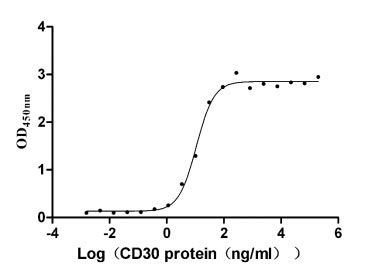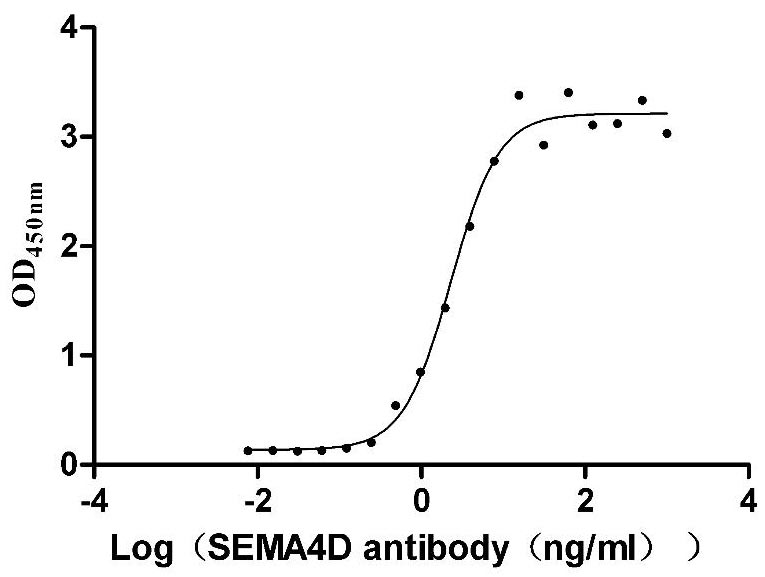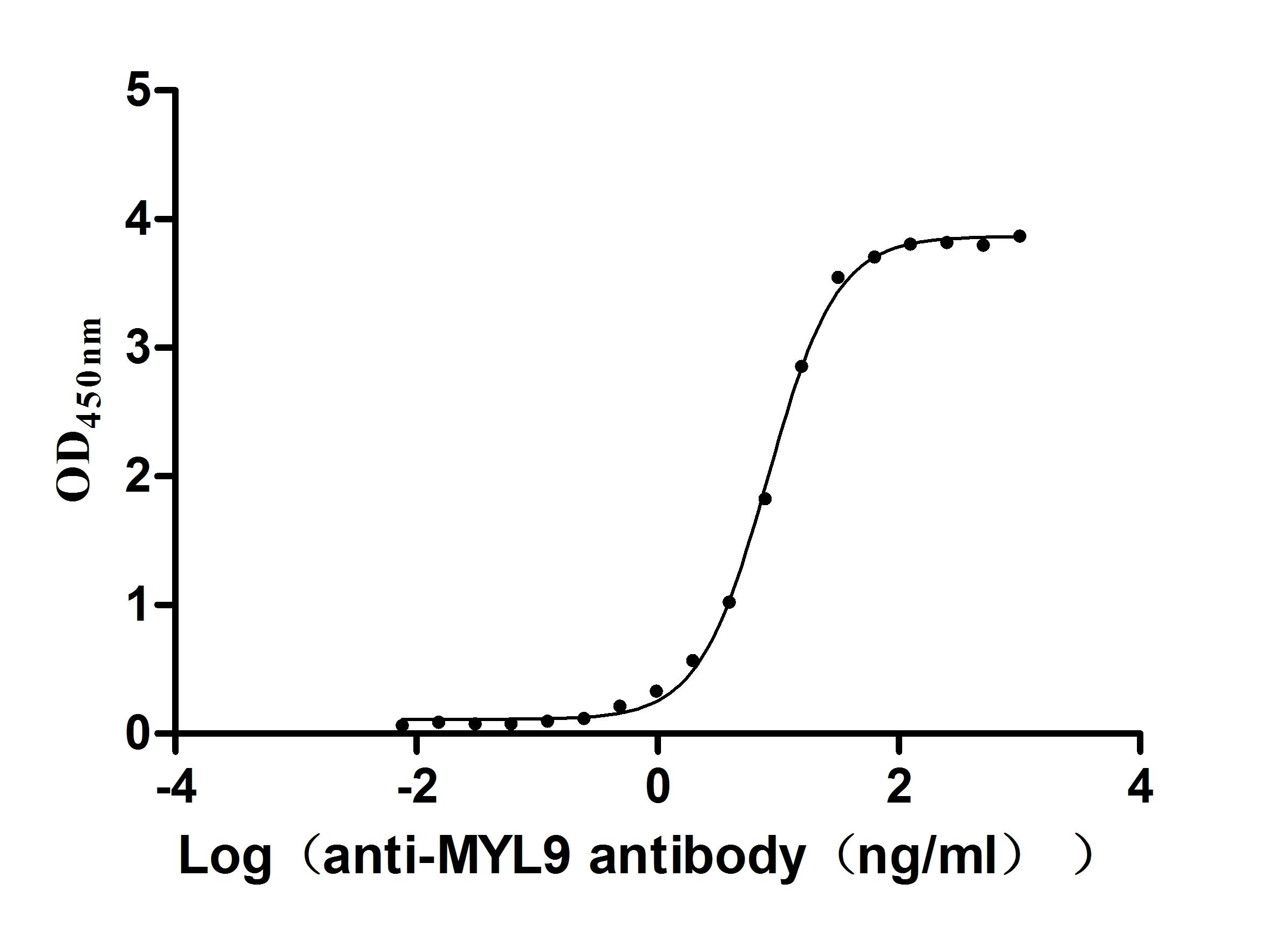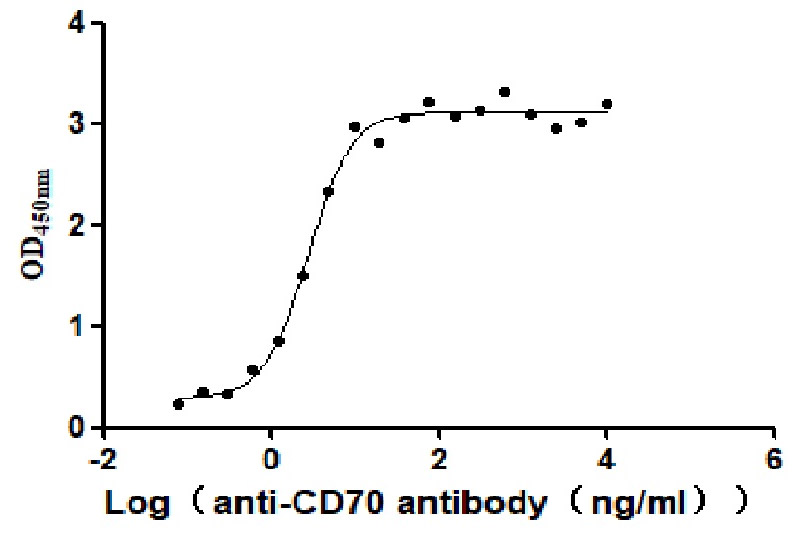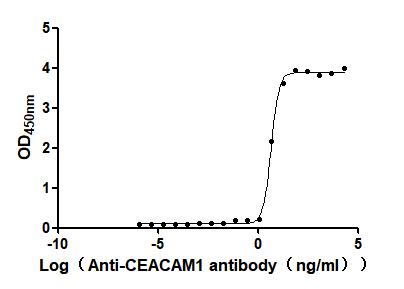Recombinant Human Single-stranded DNA cytosine deaminase (AICDA)
-
货号:CSB-YP001487HU
-
规格:
-
来源:Yeast
-
其他:
-
货号:CSB-EP001487HU
-
规格:
-
来源:E.coli
-
其他:
-
货号:CSB-EP001487HU-B
-
规格:
-
来源:E.coli
-
共轭:Avi-tag Biotinylated
E. coli biotin ligase (BirA) is highly specific in covalently attaching biotin to the 15 amino acid AviTag peptide. This recombinant protein was biotinylated in vivo by AviTag-BirA technology, which method is BriA catalyzes amide linkage between the biotin and the specific lysine of the AviTag.
-
其他:
-
货号:CSB-MP001487HU
-
规格:
-
来源:Mammalian cell
-
其他:
产品详情
-
纯度:>85% (SDS-PAGE)
-
基因名:
-
Uniprot No.:
-
别名:Activation induced cytidine deaminase; Activation induced deaminase; Activation-induced cytidine deaminase; AICDA; AICDA_HUMAN; AID; ARP 2; ARP2; CDA 2; CDA2; Cytidine aminohydrolase; HIGM2; Integrated into Burkitt's lymphoma cell line Ramos
-
种属:Homo sapiens (Human)
-
蛋白长度:full length protein
-
表达区域:1-198
-
氨基酸序列MDSLLMNRRK FLYQFKNVRW AKGRRETYLC YVVKRRDSAT SFSLDFGYLR NKNGCHVELL FLRYISDWDL DPGRCYRVTW FTSWSPCYDC ARHVADFLRG NPNLSLRIFT ARLYFCEDRK AEPEGLRRLH RAGVQIAIMT FKDYFYCWNT FVENHERTFK AWEGLHENSV RLSRQLRRIL LPLYEVDDLR DAFRTLGL
-
蛋白标签:Tag type will be determined during the manufacturing process.
The tag type will be determined during production process. If you have specified tag type, please tell us and we will develop the specified tag preferentially. -
产品提供形式:Lyophilized powder
Note: We will preferentially ship the format that we have in stock, however, if you have any special requirement for the format, please remark your requirement when placing the order, we will prepare according to your demand. -
复溶:We recommend that this vial be briefly centrifuged prior to opening to bring the contents to the bottom. Please reconstitute protein in deionized sterile water to a concentration of 0.1-1.0 mg/mL.We recommend to add 5-50% of glycerol (final concentration) and aliquot for long-term storage at -20℃/-80℃. Our default final concentration of glycerol is 50%. Customers could use it as reference.
-
储存条件:Store at -20°C/-80°C upon receipt, aliquoting is necessary for mutiple use. Avoid repeated freeze-thaw cycles.
-
保质期:The shelf life is related to many factors, storage state, buffer ingredients, storage temperature and the stability of the protein itself.
Generally, the shelf life of liquid form is 6 months at -20°C/-80°C. The shelf life of lyophilized form is 12 months at -20°C/-80°C. -
货期:Delivery time may differ from different purchasing way or location, please kindly consult your local distributors for specific delivery time.Note: All of our proteins are default shipped with normal blue ice packs, if you request to ship with dry ice, please communicate with us in advance and extra fees will be charged.
-
注意事项:Repeated freezing and thawing is not recommended. Store working aliquots at 4°C for up to one week.
-
Datasheet :Please contact us to get it.
相关产品
问答及客户评论
Can you please provide the following information regarding your product AICDA recombinant protein (CSB-MP001487HU):
What mammalian cell line is used for mammalian expression system?
Please let me know if you have any additional questions.
Recombinant Human Single-stranded DNA cytosine deaminase(AICDA)
CSB-MP001487HU >> Mammalian cell
Expression Region: 1-198aa; Full length.
Tag information: Tag type will be determined during the manufacturing process.
The expected tag is N-terminal 10xHis-tagged and C-terminal Myc-tagged.
Sequence:
MDSLLMNRRKFLYQFKNVRWAKGRRETYLCYVVKRRDSATSFSLDFGYLRNKNGCHVELLFLRYISDWDLDPGRCYRVTWFTSWSPCYDCARHVADFLRGNPNLSLRIFTARLYFCEDRKAEPEGLRRLHRAGVQIAIMTFKDYFYCWNTFVENHERTFKAWEGLHENSVRLSRQLRRILLPLYEVDDLRDAFRTLGL
Generally, we will use HEK 293 for the mammalian cell expression system. The cell has high growth rate, it's easy to be transfected, and has high expression of foreign protein.
靶点详情
-
功能:Single-stranded DNA-specific cytidine deaminase. Involved in somatic hypermutation (SHM), gene conversion, and class-switch recombination (CSR) in B-lymphocytes by deaminating C to U during transcription of Ig-variable (V) and Ig-switch (S) region DNA. Required for several crucial steps of B-cell terminal differentiation necessary for efficient antibody responses. May also play a role in the epigenetic regulation of gene expression by participating in DNA demethylation.
-
基因功能参考文献:
- this study reports the clinical and AID genetic features of six Iranian hyper IgM syndrome patients PMID: 30081731
- induction of AID expression would result in chromosomal translocations in the process of differentiation from B cell derived induced pluripotent stem cells. PMID: 28490810
- The distribution of AID and A3s in the epithelial cells as well as germinal centres. PMID: 29343743
- patients with AS expressed significantly higher levels of sv2 than HC. TNFi treatment restored the gene expression of the AID variants (FL, sv1, and sv2) in patients with AS. Therefore pre-existing TNFalpha-induced AID expression in B cells may play a role in the pathogenesis of AS. PMID: 28959900
- we reported high AID, low miR-181b and high miR-155 expression in de novo adult B-ALL patients. Univariate high AID or low miR-181b expression was an unfavorable prognostic factor. High AID with low miR-181b or with low miR-155 expression is better in predicting unfavorable OS than univariate factor. High AID with low miR-181b and low miR-155 expression confers worst prognosis. PMID: 28140712
- AID expression was increased in chronic lymphocytic leukemia patients with del17p or del11q who have poor prognosis. PMID: 28388279
- Results indicate activation-induced cytidine deaminase (AICDA) as a driver of epigenetic heterogeneity in B-cell lymphomas with potential significance for other tumors with aberrant expression of cytidine deaminases. PMID: 29335468
- The binding and catalytic behavior of purified AID was tested on DNA/RNA hybrid substrates bearing either random sequences or GC-rich sequences simulating Ig S regions. AID exhibited a higher affinity for binding DNA/RNA hybrid substrates made of S region sequences, than any other DNA substrates. In the absence of any other cellular processes or factors, AID itself favors binding and mutating S-region DNA/RNA hybrids. PMID: 29161581
- Expression of human AID or increased oxidative stress induces DNA breaks within human chromosomal translocation fragile zones. PMID: 29220655
- Data implicate intrinsic preference of AID for structured substrates and uncover the importance of G4 recognition and oligomerization of AID in class switch recombination. PMID: 28757211
- the His130Pro mutation allows the enzyme to retain its mutagenic activity and would prevent the interaction of AID with specific cofactors required for class switch recombination but not for somatic hypermutation. Thus, there would be no contradiction between maintaining the catalytic and mutagenic activity of AID and the presence of function defects at the genomic level. PMID: 27716525
- The s found that the viral epsilon RNA and C-terminus of AID are required for AID-mediated hepatitis B virus RNA reduction. PMID: 28779685
- silencing of AID in human bone marrow cells skews differentiation toward myelomonocytic lineage. However, in contrast to Tet2 loss, Aid loss does not contribute to enhanced HSC self-renewal or cooperate with Flt3-ITD to induce myeloid transformation. Genome-wide transcription and differential methylation analysis uncover the critical role of Aid as a key epigenetic regulator PMID: 28077417
- AID protein is expressed in a large proportion of Philadelphia chromosome-positive B-cell acute lymphoblastic leukemia cases at levels detectable by immunohistochemistry. PMID: 26980048
- These data, showing the direct targeting and induction of functional AID by EBNA3C, suggest a novel role for EBV in the etiology of B cell cancers, including endemic Burkitt lymphoma PMID: 27217538
- These findings indicated that TNF-alpha-induced AID expression is involved with class switch recombination in cancer. PMID: 25849121
- Finnish founder allele causing HIGM2 identified. PMID: 27142677
- Structural analysis of AID protein required in immunoglobulin diversification has been reported. PMID: 27258794
- this study reports a case of growth hormone deficiency with an autosomal recessive Hyper-immunoglobulin M syndrome by phenotype and genotype, with a novel mutation in AICDA that has not been reported formerly PMID: 27789066
- We also report that AID activity results in epigenetic, genetic and genomic damage in fallopian tube epithelial cells PMID: 26936395
- AICDA/APOBEC family of cytidine deaminases is significant in innate immunity, as it restricts numerous viruses, including HBV, through hypermutationdependent and independent mechanisms. (Review) PMID: 26398702
- DNA methylation dynamics of germinal center B cells are mediated by AID. PMID: 26365193
- Mutations in activation-induced cytidine deaminase is associated with indolent chronic lymphocytic leukaemia. PMID: 26638776
- Data suggest novel mechanism in innate immunity allows cytokine TGF-beta to restrict viral circular DNA in hepatocyte nuclei via innate immunity; AID deaminates circular DNA of hepatitis B virus leading to DNA degradation; mechanism depends on UNG. PMID: 26867650
- The high levels of memory and activated B cells and follicular helper T cells were positively associated with the progression of immunoglobulin A nephropathy. This may be mediated by the overexpression of AID, which is potentially regulated by IL21. PMID: 26166388
- identify AID derivatives that accelerate somatic hypermutation with minimal impact on viability, which will be useful tools for engineering genes and proteins by iterative mutagenesis and selection PMID: 26355458
- High expression of activation-induced cytidine deaminase is associated with diffuse large B cell lymphoma. PMID: 26077666
- AID mutations leading to AID deficiency are the most frequent underlying molecular basis of hyper IgM syndrome in consanguineous Tunisian patients. PMID: 26545377
- Studies indicate that gene conversion mediated by activation-induced cytidine deaminase (AID) has been found to contribute to generation of the primary antibody repertoire. PMID: 26537386
- aberrant expression of AID may reflect continuous B cell activation and sustained survival signals in HCV-related CV patients. PMID: 26219420
- Surges in ERK activity induced by extracellular cues enhance Arp2/3-mediated actin polymerization to generate protrusion power phases sufficient to promote sustained cell motility. PMID: 25990957
- Data show that microRNAs miR-155 and miR-16 downregulate activation-induced cytidine deaminase (AID) and transcription factor E47 in B Cells through binding of the 3'-untranslated regions. PMID: 26223652
- Data indicate that both the amount and intensity of the activation-induced cytidine deaminase (AID) protein expression increased with the progression from precancerous to cancerous lesions in pancreatic ductal adenocarcinoma (PDAC) tissues. PMID: 26113087
- B cells hijack to supply ssDNA substrates for AID to mutate at immunoglobulin V regions during somatic hypermutation. PMID: 24923561
- HSP90 inhibitors indirectly target AID in vivo PMID: 25912253
- findings suggest that AID has a role in the development of oral epithelial dysplasia and promotes progression of oral cancer PMID: 24351917
- hnRNP K and hnRNP L may serve as A1CF-like cofactors in AID-mediated class switch recombination and somatic hypermutation PMID: 25902538
- Activation-induced cytidine deaminase (AID)-induced mutagenic U:G mismatches in DNA may be a fundamental and common cause of mutations in B-cell malignancies. PMID: 25486549
- In yeast, AID and the catalytic domain of APOBEC3G preferentially mutate transcriptionally active genes within narrow regions, 110 base pairs in width, fixed at RNA polymerase initiation sites. PMID: 25237741
- There was no significant association between the previously reported genetic variant of AICDA gene and the development of Common variable immunodeficiency or selective IgA deficiency PMID: 23731676
- demonstrates that intensity of malaria transmission correlates with AID expression levels in the presence of Epstein-Barr virus PMID: 25099163
- Study reports that the majority of detectable AID off-target activity in a variety of mouse and human lymphoid or nonlymphoid cell types occurs within focal regions of overlapping sense/antisense transcription within intragenic super enhancers. PMID: 25483776
- AID activity and its relationship to chromosome folding and the B cell regulome was studied; find that AID-mediated lesions occur predominantly within B cell super-enhancers and regulatory clusters; further show that the structural and transcriptional features of these domains help explain AID tumorigenic activity in the B cell compartment of mice and humans. PMID: 25483777
- data demonstrate that AID is active in CLL in vivo and thus, AID likely contributes to clonal evolution of CLL. PMID: 25179679
- analysis of a possible association between AID expression and BRAF mutation in melanoma PMID: 24684646
- Results show that both AID mRNA levels and DNA-cytosine deamination activities follow the same general pattern of increase and decline after stimulation in the two genetic backgrounds. PMID: 25154417
- DNA repair pathways which are in vitro activated by AID-induced lesions are reminiscent of those found during AID-induced in vivo immunoglobulin diversification. PMID: 24349193
- Results show that activation induced cytidine deaminase (AID) expression may be associated with deletions in patients with chronic lymphocytic leukemia (CLL). PMID: 23662991
- AID lacking the C terminus is impaired in its ability to recruit nonhomologous end joining repair factors, resulting in accumulation of double-strand breaks that undergo aberrant resection. PMID: 24973444
- findings reveal additional functions for AID in innate immune defense against KSHV with implications for a broader involvement in innate immunity to other pathogens. PMID: 24244169
显示更多
收起更多
-
相关疾病:Immunodeficiency with hyper-IgM 2 (HIGM2)
-
亚细胞定位:Nucleus. Cytoplasm.
-
蛋白家族:Cytidine and deoxycytidylate deaminase family
-
组织特异性:Strongly expressed in lymph nodes and tonsils.
-
数据库链接:
HGNC: 13203
OMIM: 605257
KEGG: hsa:57379
STRING: 9606.ENSP00000229335
UniGene: Hs.149342
Most popular with customers
-
Recombinant Human Tumor necrosis factor ligand superfamily member 8 (TNFSF8), partial (Active)
Express system: Mammalian cell
Species: Homo sapiens (Human)
-
Recombinant Macaca mulatta Semaphorin-4D isoform 1 (SEMA4D), partial (Active)
Express system: Mammalian cell
Species: Macaca mulatta (Rhesus macaque)
-
Recombinant Human Myosin regulatory light chain 12B(MYL12B) (Active)
Express system: E.coli
Species: Homo sapiens (Human)
-
Recombinant Human CD70 antigen (CD70), partial (Active)
Express system: Mammalian cell
Species: Homo sapiens (Human)
-
Recombinant Macaca fascicularis Transmembrane 4 L6 family member 1 (TM4SF1)-VLPs (Active)
Express system: Mammalian cell
Species: Macaca fascicularis (Crab-eating macaque) (Cynomolgus monkey)
-
Express system: Mammalian cell
Species: Homo sapiens (Human)


